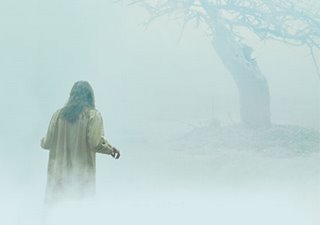 An increasingly stringy-looking Jodie Foster plays another threatened mother (as she did to middling effect in David Fincher’s Panic Room), in the taut airborne thriller Flight Plan, a high-concept titty-twister we will call ‘Hitchcockian’ for the lack of another neat descriptive word that means ‘movie that picks your pocket through pat co-incidence, suspense and plot twists’ The seriously flinty Foster plays Kyle Pratt, an aeronautical engineer who boards the same enormous jet she has spent the past year working on, in order to bring the coffin containing her recently deceased husband back to the US. A couple of hours after takeoff from a snowbound Berlin, Kyle and her six year old daughter Julia (Marlene Lawston) fall asleep. When mommy wakes up, the kid has vanished.
An increasingly stringy-looking Jodie Foster plays another threatened mother (as she did to middling effect in David Fincher’s Panic Room), in the taut airborne thriller Flight Plan, a high-concept titty-twister we will call ‘Hitchcockian’ for the lack of another neat descriptive word that means ‘movie that picks your pocket through pat co-incidence, suspense and plot twists’ The seriously flinty Foster plays Kyle Pratt, an aeronautical engineer who boards the same enormous jet she has spent the past year working on, in order to bring the coffin containing her recently deceased husband back to the US. A couple of hours after takeoff from a snowbound Berlin, Kyle and her six year old daughter Julia (Marlene Lawston) fall asleep. When mommy wakes up, the kid has vanished. Watching her every move is federal air marshal Carson (Peter Sarsgaard), concerned about the safety of the flight after Kyle, teetering on the edge of hysteria, sees an Arab passenger (Michael Irby) and tells him she is convinced he is spying on her. Already barely holding it together, Kyle methodically searches the airplane, having the advantage of knowing it inside out. Appearing far more sane and rational to the cabin crew than the cinema audience, who have the advantage of knowing her mind inside out, Kyle’s search appears over when a stewardess (Erika Christensen) tells her that Julia’s name doesn’t appear on the passenger manifest, the departure gate at Munich says she did not get on the plane, her boarding pass and backpack are nowhere to be found and that the girl was never on board. The flight captain, played by a suitably square-jawed Sean Bean, while initially concerned about the disappearance, applies strict procedure when told the child wasn’t on the plane and that this bereaved woman has lost her senses.
And that's all you'll get from me. Regardless of the films qualities, it wouldn’t be fair to tell you any more. With this kind of thriller, the more you know in advance, the less effective the film will be. With such strong story elements at his disposal; separation, claustrophobia, unsympathetic officials and shifty-eyed, suspicious passengers, German director Robert Schwentke constructs a sweaty, cleverly convoluted story that is nevertheless a touch too cold and remote to connect with the impact it could have had.
Foster is good as the tough, resilient woman who uses her strengths to defend her child against an unknown threat, but she is in danger of running herself into a groove here. It’s the torturous unravelling of the exact nature of that threat that this film balances precariously upon, with the ultimate revelation bound to dismay as many as it delights. Why this is hapenning to her, out of all the people on the plane, is the key here and as with any other ‘sealed room’ Agatha Christie body-in-the-library mystery, that individually fashioned key might just barely fit the logical lock the storytellers have constructed around it. The great debt here is to Alfred Hitchcock's The Lady Vanishes, and the novel that inspired it, Ethel Lina White's The Wheel Spins, from where the central notions have been extracted, without credit. Like the train itself in Hitchcock's yarn, the Titanic-sized aircraft becomes a character, initially a suffocating, claustrophobic presence, but as the film explores every nook and cranny of the metal tube, there is far more made of it than is entirely necessary.
Cunningly, and crucially for interest levels, Schwentke and his screenwriters Peter Dowling and Billy Ray ask the audience another, deeper question, one that adds a sustaining nuance to Kyle’s motivations and makes our heroine completely, and satisfyingly, unreliable. Is she mad, from grief, or just madness itself, unexpected and terrible. For her part, when faced with this nightmare, Foster's character asks the same questions as we the viewers would, and for the most part, does what we would expect a woman in her position to do, keeping pace with the audience’s own internal logic as the plot unravels itself. But, and there’s almost always a but, the rush of unlikely co-incidences and hysterical revelations in the final third of the film go way too far, taking most of the painstakingly generated tension along with them. For all its shiny production values, A-list cast and swooping widescreen photography, Flightplan ultimately touches down on a well-worn runway about twenty minutes after you will.













